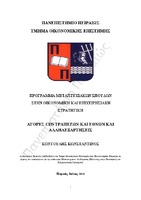Αγορές CDS τραπεζών και εθνών και αλληλεξαρτήσεις
Sovereign and bank CDS markets and interlinkages

Προβολή/
Θεματική επικεφαλίδα
Διεθνής οικονομία ; Τράπεζες και τραπεζικές εργασίες ; Πιστωτικός κίνδυνος ; Ομόλογα ; International finance ; Banks and banking ; Credit risk ; Granger causalityΠερίληψη
Οι αλληλεξαρτήσεις τραπεζών και εθνών εστιάζουν έντονα την προσοχή της επενδυτικής κοινότητας στην αγορά των ασφαλίστρων πιστωτικού κινδύνου (CDS). Σκοπός της εργασίας είναι να περιγράψει μηχανισμούς διάχυσης των κρίσεων και διπλής ανάδρασης μεταξύ του κινδύνου αθέτησης που ενυπάρχει ανάμεσα σε έθνη και τράπεζες. Ακολούθως εξετάζονται και οι εμπειρικές εκφάνσεις αυτών των σχέσεων, με ποσοτικές μεθόδους για 10 ευρωπαϊκά έθνη, 20 αντίστοιχα τραπεζικά ιδρύματα προερχόμενα από τα ίδια έθνη, και 3 γενικούς δείκτες τάσης των αγορών. Οι μέθοδοι αυτοί θα ελέγξουν για ύπαρξη μοναδιαίας ρίζας, για ύπαρξη συνολοκλήρωσης, ύπαρξη αιτιοτήτων κατά Granger με την προσέγγιση των Dumitrescu-Hurlin (2012) καθώς και θα εξαχθούν από αυτοπαλίνδρομο σύστημα VECM ο έλεγχος Granger Causality Block Exogeneity και οι συναρτήσεις αιφνιδίων αντιδράσεων (impulse responses). Θεμελιώδης στόχος είναι να ερευνηθεί η κρατικο-τραπεζική αλληλεξάρτηση κινδύνου ανάμεσα στις εξεταζόμενες οντότητες και όλα αυτά με πληρεξούσια μεταβλητή τα ασφάλιστρα πιστωτικού κινδύνου. Αυστηρά υπάρχει πρόθεση να περιοριστεί όλη η ανάλυση στο πλαίσιο της αποτελεσματικότητας της αγοράς ασφαλίστρων πιστωτικού κινδύνου χρησιμοποιώντας δεδομένα πάνελ. Αποτελεσματικότητα ανευρέθηκε στην υπόθεση της ασθενούς μορφής. Παρόλα αυτά χαρακτηριστικό είναι το εύρημα ότι οι αιτιότητες κάνουν την εμφάνιση τους και κατ’ επέκταση αναποτελεσματικότητες υπάρχουν στην αγορά των ασφαλίστρων πιστωτικού κινδύνου στην ενδιάμεση μορφή. Αυτό το εύρημα δίνει χρόνο ζωής στην πρόβλεψη και επίσης είναι ένα εμπορικό σημάδι για την άσκηση του μηχανισμού της εξισορροπητικής κερδοσκοπίας (arbitrage), συνεργατικά με μια στρατηγική αυξημένου συναγερμού για την ανίχνευση της όποιας καινοτόμας πληροφορίας η οποία θα προκαλέσει διατάραξη στην ισορροπία της αγοράς. Τέλος μια σημαντική εκροή της εργασίας είναι τόσο η θεωρητική όσο και η εμπειρική απόδειξη ότι οι ‘πρώτες’ μεγαλύτερες τράπεζες κάθε εξεταζόμενης ευρωπαϊκής χώρας μακροπρόθεσμα καθίστανται περισσότερο ανεξάρτητες και αποδυναμώνεται η επεξηγηματική ικανότητά τους πάνω στη πιστωτική συμπεριφορά του αντίστοιχου έθνους. Πιθανώς αυτό να αποδίδεται στο ότι οι βοήθειες από τα έθνη προς τις τράπεζες τις ενδυνάμωσαν πράγματι γενναία.


